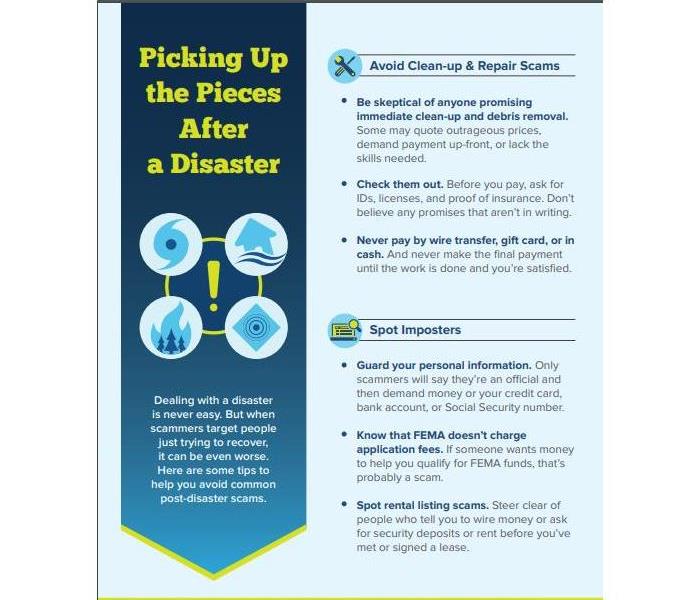Post-Storm and Disaster Scams in Western New York
12/2/2020 (Permalink)
 The FTC's "Picking Up The Pieces After a Disaster" flyer gives great tips for identifying and avoiding scammers.
The FTC's "Picking Up The Pieces After a Disaster" flyer gives great tips for identifying and avoiding scammers.
It sounds counterintuitive, but here at SERVPRO of The Southtowns, we wish no one ever needed us. We care a lot about our customers, and we wish they never suffered a disaster in the first place.
Unfortunately, emergencies happen, and we’re grateful that we’re able to help people pick up the pieces.
Some of the most heartbreaking stories we hear, however, are about times when our customers had disasters, and they didn’t know to call us.
Post-disaster scams happen. They’re more prevalent in hurricane zones, where widespread damage is more commonplace, but that doesn’t mean they can’t happen here in Western New York.
You don’t have to take our word for it. The Federal Trade Commission recently put out tips for identifying and avoiding scams after a disaster because it had become such a widespread problem. Here’s what they suggest:
- If someone approaches you promising clean-up and debris removal immediately, be skeptical and don’t just say yes. It can be tempting to hire the crew that’s standing right in front of you, but if you don’t do a bit of research before saying yes, they may end up charging you astronomical prices, and they may not even have the skills or resources to really get the job done right.
- Instead, do your homework. Ask to see their ID, licenses and proof of insurance. Get a written estimate before agreeing to proceed with work, even if they insist that “insurance will cover everything.”
- Talk to your insurance company before proceeding. Ask if they have heard of the company that you’re considering working with, and get a sense of what will and will not be covered, and how much it will be covered for.
- Be extra careful if someone claims to be a government official. Scammers have started to claim to be affiliated with FEMA or other government agencies to collect Social Security numbers, credit cards and banking information. They may also charge you an “application fee” to put in an application with FEMA. Those fees are usually part of the scam.
- When it comes time to render payment, don’t pay by wire transfer, gift card or in case. You want your payment to be traceable and verifiable. Don’t pay upfront, either - withhold full payment until the work is done and you are satisfied.
- Rental scams are also prevalent in major disasters. If someone approaches you with a short-term rental option if you’re displaced from your home, be wary if they ask you to wire them money, or demand payment before you’ve met or signed a lease.
- Charity scams have also become more prevalent. After a disaster, scammers pop up claiming to be collecting money for the victims. Make sure you do your research before giving.
If you suspect that someone might be scamming you, go to ftc.gov/complaint to report it.
And if you need disaster relief, or you just want a second opinion, call SERVPRO of The Southtowns at 716-646-6684. We’re here to help.






 24/7 Emergency Service
24/7 Emergency Service